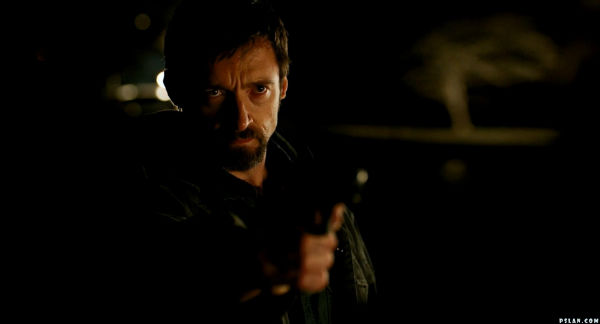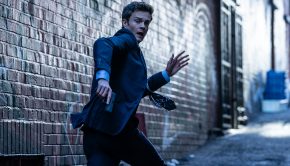Prisoners – Film Review
Reviewed by Damien Straker on October 15th, 2013
Roadshow presents a film directed by Denis Villeneuve
Written by Aaron Guzikowski
Starring: Hugh Jackman, Jake Gyllenhaal, Terrence Howard, Paul Dano, Melissa Leo, Viola Davis and Maria Bello
Rated MA15+
Running Time: 153 minutes
Released: October 17th, 2013
The best aspect of Denis Villeneuve’s film Prisoners are the two lead performances by Hugh Jackman and Jake Gyllenhaal. Both give raw and aggressive powerhouse performances and add dramatic weight to a conventionally structured but extremely gritty ‘who done it?’ thriller. Jackman plays Keller, a religious and intense family man, who takes matters into his own hands when he and his neighbours Franklin (Terrence Howard) and his wife Nancy (Viola Davis) have their daughters kidnapped. Keller believes that Alex (Paul Dano), an intellectually challenged and rarely spoken individual who lives with his aunt Holly (Melissa Leo), has taken the two little girls and follows him. It is doesn’t help that Alex feeds him lines of information that only fuel Jackman’s rage and suspicion.
The central theme of Aaron Guzikowski’s script is retribution, in particular the irony of the way ordinary people are blinded by rage and in times of grief become as immoral as the initial perpetrators. Detective Loki (Gyllenhaal) is pressed with a near irresolvable duality: he has to prove to himself that he can solve this case, he’s apparently never failed to solve one before, but also has to watch Keller closely because of his increasingly irrational and violent behaviour. He’s solving one case and then preparing for another one to unfold before it even happens. Gyllenhaal makes for an incredibly resilient and determined cop, skilfully layering his character with different sides to his personality, including intimidation tactics against suspects, to care and sincerity when he promises Keller’s wife Grace (Maria Bello) that he’ll find their daughter. The intensity and power in this performance is so strong that it overcomes the disappointment of the non-backstory of the character.
Hugh Jackman has played aggressive characters before, mainly Wolverine, but unlike his X-Men role his character doesn’t have the same nobility. Keller is a vigilante and a drunk and more of a psycho than a samurai. The amount of dramatic fury and verbal rage in this performance is startling and seemingly difficult to rein in at times. Taking action into his own hands, he resorts to kidnapping and torture for answers that may not even exist. The film opens with the Our Father prayer, which gains meaning because in the scenes of torture Keller’s anger prevents him from forgiving ‘those who trespass against us’. In an unrelentingly grim film, sometimes heavy-handed in its mood and tone, the torture scenes verge on being over the top. These are truly horrific, ugly moments, so disturbing that they’re almost unwatchable in their violent confrontations. Inevitably, the extremity of Keller’s actions diminishes a lot of our sympathy for his character and the case.
Arguably, the torture scenes are not included just for pure sadism. As well as retribution Villenuve is concerned with the way that people are entrapped by their perceptions of the truth and how much faith they have in their own beliefs. Reflecting this notion is the beautiful, largely static camerawork by cinematographer Roger Deakins (superb work again after True Grit), who frames the interiors of this rather muted and drab setting in a way that it makes the characters appear like prisoners of their own personal values and motives. The editing is also patient, providing time for the actors to inhabit their characters in medium close-up shots. It’s a shame though that some of the side actors like Maria Bello and Viola Davis have very few scenes written where they can truly utilise their talents. There is still great suspense built through the film though and its most effective, not when it’s violent, but when it forges a sense of unseen, foreboding danger preparing to intrude on the characters.

The narrative of Prisoners is structured like a police procedural and it’s extremely complex when accounting for a number of subplots that feed into the main crime. The film is very long, running at two and a half hours, and some of the more ambiguous aspects of the plot feel hurried, including a book with a maze that involves a copycat suspect. A second viewing might tie a lot of these elements together more neatly. Given the unpleasantness of this film, I’m not sure it’s something I have any desire to see again. Despite the convoluted threads and the film’s substantial efforts to blur the lines of morality, there are still very conventional mystery beats followed here, meaning you will be waiting right till the end for any revelations and for the police to notice that one key clue. Although I had trouble connecting all the dots of the plot, the very end is thankfully an excellent final scene. It echoes the film’s central concept: we are all eventually captives of our actions and the systems of law emplaced by society or the people who think they know better.
Summary: The central theme of Aaron Guzikowski's script is retribution, in particular the irony of the way ordinary people are blinded by rage and in times of grief become as immoral as the initial perpetrators







